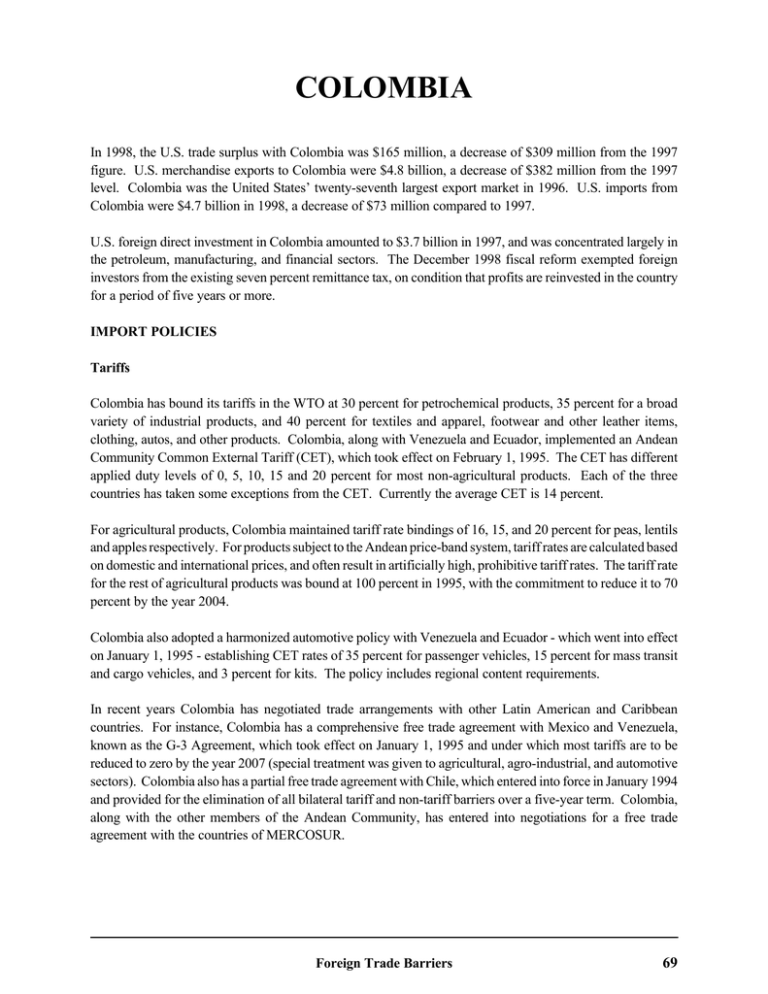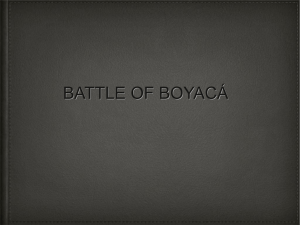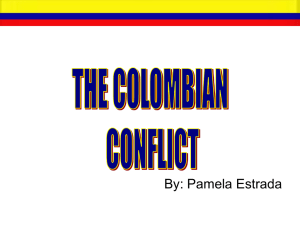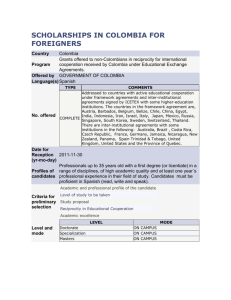COLOMBIA
advertisement

COLOMBIA In 1998, the U.S. trade surplus with Colombia was $165 million, a decrease of $309 million from the 1997 figure. U.S. merchandise exports to Colombia were $4.8 billion, a decrease of $382 million from the 1997 level. Colombia was the United States’ twenty-seventh largest export market in 1996. U.S. imports from Colombia were $4.7 billion in 1998, a decrease of $73 million compared to 1997. U.S. foreign direct investment in Colombia amounted to $3.7 billion in 1997, and was concentrated largely in the petroleum, manufacturing, and financial sectors. The December 1998 fiscal reform exempted foreign investors from the existing seven percent remittance tax, on condition that profits are reinvested in the country for a period of five years or more. IMPORT POLICIES Tariffs Colombia has bound its tariffs in the WTO at 30 percent for petrochemical products, 35 percent for a broad variety of industrial products, and 40 percent for textiles and apparel, footwear and other leather items, clothing, autos, and other products. Colombia, along with Venezuela and Ecuador, implemented an Andean Community Common External Tariff (CET), which took effect on February 1, 1995. The CET has different applied duty levels of 0, 5, 10, 15 and 20 percent for most non-agricultural products. Each of the three countries has taken some exceptions from the CET. Currently the average CET is 14 percent. For agricultural products, Colombia maintained tariff rate bindings of 16, 15, and 20 percent for peas, lentils and apples respectively. For products subject to the Andean price-band system, tariff rates are calculated based on domestic and international prices, and often result in artificially high, prohibitive tariff rates. The tariff rate for the rest of agricultural products was bound at 100 percent in 1995, with the commitment to reduce it to 70 percent by the year 2004. Colombia also adopted a harmonized automotive policy with Venezuela and Ecuador - which went into effect on January 1, 1995 - establishing CET rates of 35 percent for passenger vehicles, 15 percent for mass transit and cargo vehicles, and 3 percent for kits. The policy includes regional content requirements. In recent years Colombia has negotiated trade arrangements with other Latin American and Caribbean countries. For instance, Colombia has a comprehensive free trade agreement with Mexico and Venezuela, known as the G-3 Agreement, which took effect on January 1, 1995 and under which most tariffs are to be reduced to zero by the year 2007 (special treatment was given to agricultural, agro-industrial, and automotive sectors). Colombia also has a partial free trade agreement with Chile, which entered into force in January 1994 and provided for the elimination of all bilateral tariff and non-tariff barriers over a five-year term. Colombia, along with the other members of the Andean Community, has entered into negotiations for a free trade agreement with the countries of MERCOSUR. Foreign Trade Barriers 69 Colombia Colombia’s Tax Law, Law 223, which took effect on January 1, 1996, subjected all distilled spirits to a valueadded tax of 35 percent. However, the law makes an exception for whiskeys aged 12 or more years, which are subject to a 20 percent value-added tax. Bourbon and Tennessee Whiskey -- both distinctive products for the United States -- are typically aged from four to eight years and, as a consequence, face a higher tax rate than most competing imported whiskeys which are aged longer. This distinction between whiskeys creates a competitive disadvantage for Bourbon and Tennessee Whiskey. The United States has protested this discrimination but the Government of Colombia has failed to eliminate it. Colombia requires import licenses for less than two percent of products, primarily weapons and other products related to defense, as well as “precursor” chemicals that may be used in refining cocaine. The majority of used goods, used cars, remanufactured auto parts, tires and clothing - are prohibited from import, and those that are allowed, such as machinery, are subject to licensing. The agriculture sector in Colombia remains protected. Since the promulgation of Decree 2439 in November 1994, the Ministry of Agriculture has been required to approve import licenses for many agricultural items, such as wheat, poultry meat, malting barley, corn, cotton, rice, sorghum, wheat flour, oil seeds and their products (e.g., soybeans, soybean meal, and soybean oil). Colombia has implemented absorption agreements which require an importer to purchase a government-specified quantity of domestically produced goods as a precondition for the granting of import licenses. If the import licensing requirement for the products indicated above were eliminated, estimated U.S. annual exports could increase by up to $10 million. Fourteen basic agricultural commodities (powdered milk, wheat, malting barley, yellow and white corn, crude palm and soybean oils, white rice, soybeans, white and raw sugars, chicken and turkey pieces and pork meat), and an additional 120 commodities considered substitutes or related products, are subject to a variable import tariff “price band” system. Imported wheat is also subject to minimum import prices. The Colombian Foreign Trade Institute (INCOMEX) requires approval by the Ministry of Agriculture (MAG) prior to the importation of chicken and turkey, whole birds or parts. Under this system, the Government of Colombia has approved import licenses only when it has determined such imports will not adversely affect Colombian producers. Since 1994, import licenses for U.S. chicken and turkey parts have been regularly denied, and licenses for whole birds are often delayed. If the import licensing requirement for chicken and turkey parts were eliminated, it is estimated that U.S. annual exports would increase by approximately $10 million. Valuation of imported merchandise, previously the responsibility of the customs service, can now ostensibly be done by importers who self-value, assess, and pay duties and other taxes at commercial banks. Customs clearance processes in many instances can be performed fairly rapidly. However, Colombia’s pre-shipment inspection of imported equipment must be performed by one of several independent testing agencies which, according to U.S. industry, results in unnecessary delays. Through a series of resolutions dating back to November 1994, the Colombian Government has created a pre-shipment inspection (PSI) mechanism using private PSI companies. Colombia allows PSI companies to perform certain direct functions under the control of the national tax and customs directorate (DIAN). As of February 1, 1996, PSI companies began mandatory preclearance of all goods defined as “sensitive” by the Colombian Government. Inconsistencies on the part of customs in adhering to standardized procedures, and lack of transparency in enforcement, continue to create delays and problems. Procedures vary depending on the port of departure and arrival of 70 Foreign Trade Barriers Colombia the merchandise, and rules and regulations are often contradictory. Colombian Customs presented, in December 1998, a project to apply more efficient procedures through a “unique sanction regime”; however, improvements are yet to be observed. STANDARDS, TESTING, LABELING AND CERTIFICATION The Colombian Institute of Technical Standards (ICONTEC), a private non-profit organization, is also responsible for technical standards’ development, provides quality certification and technical support services, and serves as an Underwriters’ Laboratories (UL) inspection center. ICONTEC is a member of the International Standards Organization (ISO) and the International Electrotechnical Commission (IEC). According to U.S. industry, Colombian requirements for phytosanitary registrations to bring new products into the market take an excessively long time, six to eight months, to fulfill. GOVERNMENT PROCUREMENT The Government Procurement and Contracting Law, Law 8C/93, sought to establish simpler and more transparent procedures based on the principles of economy, transparency and objective selection. It provides equal treatment to foreign companies on a reciprocal basis and eliminates the 20 percent surcharge previously added to foreign bids. It also eliminated unnecessary requirements and bureaucratic procedures that increased prices of public services and limited their availability. The law also settled procedures for the selection of suppliers, mainly through public tenders and in exceptional cases through direct contacts. In implementing Law 80, the Government of Colombia instituted a requirement that companies without local headquarters must certify reciprocity in government procurement in the home country. Law 80 does not apply to contracts for the exploration and exploitation of renewable or non-renewable natural resources, their commercialization, and those activities performed by state companies involved in these sectors. Colombia is not a signatory of the WTO Agreement on Government Procurement. EXPORT SUBSIDIES As a result of “apertura” and commitments made by the Government of Colombia to the U.S. Government in the context of acceding to the GATT Subsidies Code, Colombia agreed to phase out any export subsidies inconsistent with that Code. This process will continue under the WTO Agreement on Subsidies and Countervailing Measures. For instance, Colombia has notified the WTO of its “special machinery importexport system” and “free zones” as constituting export subsidies. Also, Colombia’s tax rebate certificate program (CERT) contains a subsidy component which the Government of Colombia has stated it will replace with an equitable drawback system, but has not yet done so. LACK OF INTELLECTUAL PROPERTY PROTECTION Colombia does not yet provide adequate and effective intellectual property protection. As a result of its laws and practices -- especially its inadequate IPR enforcement -- Colombia has been on the “Watch List” under the Special 301 provision of the 1988 Trade Act every year since 1991, and was the subject of an out-of-cycle review at the close of 1998. Colombia has ratified, but not yet fully implemented, the provisions of the WTO Agreement on Trade-related aspects of Intellectual Property Rights (TRIPs). Foreign Trade Barriers 71 Colombia A recent report by the Ministry of Foreign Trade outlines Colombia’s efforts on the subject, including an update of Decision 344 of the Andean Community, which strengthens the rights of patent owners, regulates issues related to profitability models, industrial designs and industrial secrets, and broadens protection to notorious trademarks. Notwithstanding the above, a new update of Decision 344 should focus on integrated circuits, anti-competitive practices, and measures of compliance. Pirate TV signals are a particular problem for U.S. film and TV interests in Colombia. Many applications to render subscription TV services were submitted and are being studied by the quasi-independent Colombian National TV Commission (CNTV), which expects to formalize this type of service, granting strict control over copyright payments. However, the whole process was canceled in November 1998, without a satisfactory explanation. Patents and Trademarks Two Andean Community decisions on the protection of patents and trademarks and of plant varieties have been in effect in Colombia since January 1, 1994. The decisions are comprehensive and offer a significant improvement over previous standards on protection of intellectual property in the Andean Community Countries. For example, they provide a 20- year term of protection for patents and reversal of the burden of proof in cases of alleged process patent infringement. The provisions of the decisions covering protection of trade secrets and new plant varieties are generally consistent with world-class standards for protecting intellectual property rights. However, the decisions still contain deficiencies, including overly broad compulsory licensing provisions, working requirements, restrictions on biotechnology inventions, denial of pharmaceutical patent protection for patented products listed on the World Health Organization’s model list of essential drugs, lack of transitional (“pipeline”) protection, and lack of protection against parallel imports. In June, 1996, Colombia ratified the Paris Convention for the Protection of Industrial Property, which went into effect in September 1996. Colombian trademark protection requires registration and use of a trademark in Colombia. In a recent decree, Colombia announced that registration of a trademark must be accompanied with its use in order to prevent parallel imports. Trademark registrations have a ten-year duration and may be renewed for successive ten-year periods. Priority rights are granted to the first application for a trademark in another Andean Community Country or in any country which grants reciprocal rights. Colombia is a member of the Inter-American Convention for Trademark and Commercial Protection. Enforcement in the trademark area remains weak and the backlog of pending cases with the agency in charge of patents and trademarks -- the Superintendency of Industry and Commerce -- stands at approximately 27,000 cases. Copyrights Andean Community Decision 351 on the protection of copyrights has been in effect in Colombia since January 1, 1994. Colombia also has a modern copyright law: Law 44 of 1993. The law extends protection for computer software to 50 years, but does not classify it as a literary work. Law 44 and Colombia’s civil code include some provisions for IPR enforcement and have been used to combat infringement and protect rights. Colombia belongs to both the Berne and the Universal Copyright Conventions. Decision 351 provides a generally Berne-consistent system. Semiconductor layout designs are not protected under Colombian law. 72 Foreign Trade Barriers Colombia Colombia’s 1993 Copyright Law significantly increased penalties for copyright infringement, specifically empowering the attorney general’s office to combat piracy. Also, Colombia’s Television Broadcast Law potentially increases protection for all copyrighted programming by regulating satellite dishes. However, enforcement of copyright laws is still quite lacking and U.S. industry estimates that the majority of the videocassette, sound recording, and business software markets are pirated. Music piracy in particular has worsened in the last year, with counterfeit CDS flooding the market despite stepped up enforcement efforts by Colombian customs at points of entry. Colombia’s recent efforts against copyright infringement include a legal reform project, submitted by the attorney general to Congress, which includes a chapter of penalties for transgressions against copyright laws. The chapter includes incarceration for violations against patrimonial copyrights and fines for those who violate the protection mechanisms for patrimonial rights. The project is currently making its way through Congress. Another important project was submitted as part of the tax reform approved by the Colombian Congress, where the Colombian Tax and Customs Directorate (DIAN) is to be provided with police assistance to improve import controls and actions against pirate merchandise entering Colombian borders. SERVICES BARRIERS Under the G-3 Agreement, Colombia committed to progressively liberalize trade in services, based on the principles of national treatment, most favored nation, and not requiring a local presence. Since implementation of the General Agreement of Trade in Services (GATS), Colombia committed itself to not raise the level of certain administrative requirements that apply to foreign providers in the sectors of finance, tourism, law, accounting, information technology, mining, telecommunications, construction and engineering. However, no significant deregulation has taken place, and Colombia maintains barriers in a number of service areas including audiovisual, data processing and professional services. In some industries, percentage limits are placed on foreign equity participation. In addition, a minimum of 50 percent of any television commercial for public broadcast network programming must be produced locally. In any case, the mechanism to liberalize in services is one of strict reciprocity. Cargo reserve requirements in transport have been eliminated. However, the Ministry of Foreign Trade reserves the right to impose restrictions on foreign vessels of nations which impose reserve requirements on Colombian vessels. Foreign law firms are not permitted to have a commercial presence in Colombia unless the firm is headed by a Colombian attorney. Colombia also restricts the movement of personnel in several professional areas, such as architecture, engineering, law and construction. For firms with more than ten employees no more than ten percent of the general workforce and 20 percent of the specialists can be foreign nationals. Financial Services Foreign Trade Barriers 73 Colombia In 1991 Colombia promulgated Resolution 51, which permits 100 percent foreign ownership in financial services, although the use of foreign personnel in the financial services sector remains limited to administrators, legal representatives, and technicians. Colombia denies market access to foreign marine insurers. Colombia requires a commercial presence to sell all other insurance except international travel or reinsurance. Colombia permits 100 percent foreign ownership of insurance subsidiaries, but the establishment of branch offices of foreign insurance companies is not allowed. In March 1997, the Colombian Central Bank created a reserve requirement on all foreign loans over six months designed to reduce the amount of foreign private debt. Thirty percent of all proceeds from foreign loans were to be left on deposit with the Central Bank in a non-interest bearing account for 18 months. The deposit requirement was reduced to 25 percent in February 1998, when the foreign exchange rate threatened to exceed the top of the band, and was again reduced to ten percent in September 1998, as a means to increase liquidity, lower interest rates and reduce pressures on the dollar price. Certain loans, such as those for certain raw materials and capital goods, are exempt from this requirement. Basic Telecommunications Services In the WTO negotiations on basic telecommunications services, Colombia made quite liberal commitments on most basic telecommunications services and adopted the WTO reference paper. However, Colombia specifically prohibited “callback” services and excluded fixed and mobile satellite systems. Currently foreign investment is allowed in telecommunications firms but, under the WTO agreement, Colombia reserves the right to limit foreign investment in these firms based on an economic needs test. While Colombia has allowed new competitors into long distance and international services, high license fees are a significant barrier. Colombia did not sign onto the WTO Information Technology Agreement. INVESTMENT BARRIERS Under the Andean Community Common Automotive Policy, Colombia, Venezuela and Ecuador impose local content requirements in order to qualify for reduced duties on imports. The local content requirement for passenger vehicles was 32 percent in 1997 and has risen to 33 percent for 1998. This automotive policy is inconsistent with Colombia’s WTO obligations under Trade Related Investment Measures (TRIMs) and must be eliminated before January 1, 2000. Investment screening has been largely eliminated, and the mechanisms that still exist are generally routine and non-discriminatory. Legislation grants national treatment to foreign direct investors and permits complete foreign ownership in virtually all sectors of the Colombian economy. However, since 1994, in an effort to curb money laundering, the Colombian Government has prohibited foreign direct investors from obtaining ownership in real estate not connected with other investment activities. All foreign investment in petroleum exploration and development in Colombia must be carried out under an association contract between the foreign investor and Ecopetrol, the state oil company. The terms of the standard association contract were modified in 1994, 1995, 1997 and again in 1998, in an effort to continue to attract foreign investment. Some of the more important changes made were expanding the time periods of 74 Foreign Trade Barriers Colombia exploration and exploitation, the reimbursement of exploration costs on successful discoveries, a more profitable division of production using the “R factor” concept, and the auctioning of oil fields in general. However, security conditions continue to be worrisome, and notwithstanding the improvements in the terms of the contracts, foreign investors will probably continue to remain cautious. ELECTRONIC COMMERCE There are no known restrictions affecting electronic commerce in Colombia. OTHER BARRIERS Colombia recently liberalized prices for most pharmaceutical products which were previously subject to price controls. However, pharmaceuticals with “active principal” ingredients that have three or fewer local suppliers are still subject to price controls. In 1998, the government authorized a 14 percent price increase on those products still subject to price controls. Television Local Content Quotas As part of the de-monopolization of Colombia’s government-owned television network, Colombia passed the Television Broadcast Law, Law 182/95, effective January 1995, which increased protection for all copyrighted programming by regulating satellite dishes and permitting private television broadcasters to compete with the government-owned broadcaster. The law permits foreign direct investment in the Colombian Motion Picture Industry, but limits foreign investment to fifteen percent of the total capital of local television programming production companies. The law increased restrictions on foreign content in broadcasting, and imposed a complicated burdensome system of sub-quotas for different hours of the day. The law requires broadcasters to transmit 70 percent locally-produced programming during prime time and a range of zero to 40 percent during other times on national television, and 50 percent locally-produced programming on regional channels and local stations. Retransmissions of local productions are calculated to fulfill only part of the national content requirement. Foreign talent may be used in locally produced programming, but limits are set by the quasi-independent National Television Commission. Law 182/95 also includes burdensome restrictions on foreign investment, mandating reciprocity requirements and requirements that foreign investors be engaged actively in television operations in their country of origin. Foreign investment also must involve an implicit transfer of technology. The Television Commission has the authority to reduce these restrictions, but has not taken action in this area. Foreign Trade Barriers 75 Colombia 76 Foreign Trade Barriers




